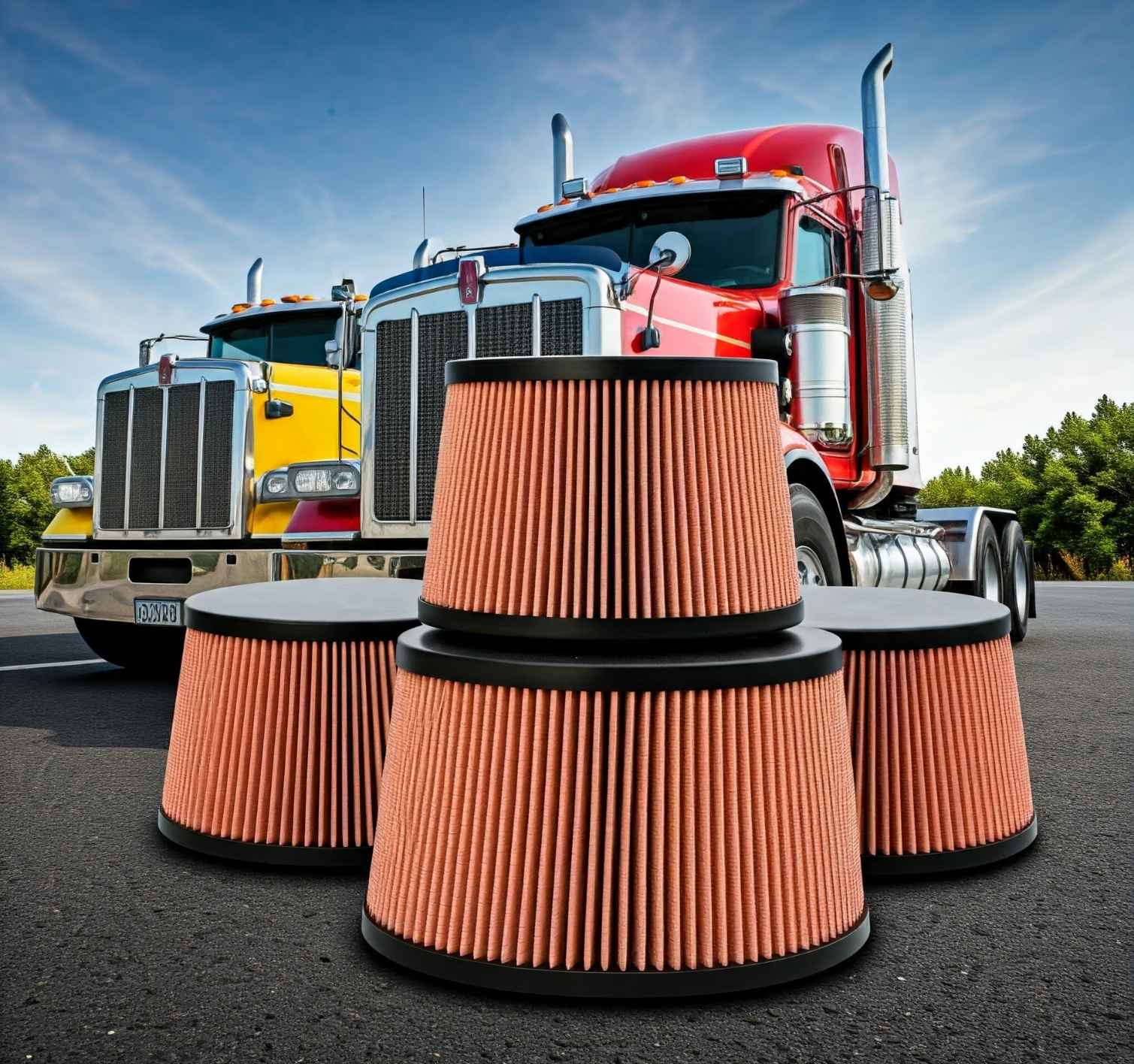
Maintaining optimal performance in American trucks requires regular care of critical components, especially the engine air filter. At TORQUE PARTS, we understand the essential role that air filters play in supporting engine health, fuel efficiency, and overall vehicle performance. This article delves into recommended intervals for replacing engine air filters in American trucks, considering factors like mileage, usage conditions, and environmental influences. By keeping these aspects in mind, you can ensure your truck runs smoothly and efficiently for the long haul.
The Role of Engine Air Filters in American Trucks
Engine air filters are responsible for protecting the engine by trapping dust, debris, and other airborne contaminants that could damage internal components. When air filters become clogged, they restrict airflow, which can reduce engine power, decrease fuel efficiency, and even lead to costly repairs. Regularly replacing the air filter can prevent these issues, making it a simple but vital part of truck maintenance.
Standard Recommendations for Air Filter Replacement
The general recommendation for most American trucks is to replace the engine air filter every 15,000 to 30,000 miles. However, these intervals can vary based on truck usage and environmental conditions. Heavy-duty trucks operating under intense conditions may require more frequent replacements. For lighter, on-road trucks, filters might last closer to the 30,000-mile mark. It’s essential to monitor filter condition and adapt your replacement intervals to your truck’s specific operating environment.
Factors Influencing Air Filter Replacement Intervals
1. Usage Conditions and Driving Habits
The way a truck is used greatly affects how quickly its air filter will need replacing. Here’s how different usage conditions impact air filter life:
- Highway Driving: Trucks primarily used for highway driving in clean, low-dust areas may need filter replacements closer to the upper limit (30,000 miles).
- Off-Road or Construction Sites: Trucks exposed to dirt, dust, and debris (like those used in construction or off-road conditions) will require more frequent filter changes. In such cases, replacing the filter every 10,000 to 15,000 miles can prevent clogging and maintain engine performance.
- Heavy Hauling and Towing: Hauling heavy loads and towing puts extra strain on the engine, which requires an unobstructed airflow. In these situations, frequent air filter checks and changes at around 15,000 miles are recommended to ensure optimal performance.
2. Environmental Factors
Environmental conditions can significantly affect the lifespan of an engine air filter in American trucks. Common factors include:
- Dusty or Polluted Areas: Dusty regions, such as deserts or areas with heavy construction, will expose air filters to higher levels of contaminants. For trucks operating in these areas, changing the air filter every 10,000 miles may be necessary.
- High Humidity or Pollen Levels: In humid climates or areas with high pollen, the air filter can get clogged faster. While these particles may not be as abrasive as dust, they can still restrict airflow and require more frequent filter changes.
- Cold Climates: Snow, road salt, and other contaminants common in colder climates can also impact air filter efficiency. Frequent visual inspections and replacements every 15,000 miles are advisable for trucks in these environments.
The Impact of a Clogged Air Filter on Performance
A clogged air filter reduces the efficiency of American trucks in several ways:
- Reduced Fuel Economy: A dirty filter forces the engine to work harder, which can lead to increased fuel consumption. Studies indicate that a clogged filter can reduce fuel economy by up to 10%, significantly affecting operating costs for long-haul truckers.
- Decreased Power and Acceleration: Restricted airflow results in poor combustion, leading to a drop in power and slower acceleration. This issue can be particularly problematic for trucks carrying heavy loads.
- Engine Wear and Tear: Unfiltered air can introduce dust and dirt into the engine, causing premature wear of internal components. Over time, this can lead to engine damage and costly repairs, making timely air filter replacements crucial.
How to Determine If Your Air Filter Needs Replacing
In addition to following a mileage-based replacement schedule, truck drivers and fleet managers should watch for signs that indicate a clogged or failing air filter:
- Visible Dirt and Debris: Regularly inspecting the air filter for visible dirt and dust build-up can help you identify when it’s time for a replacement.
- Reduced Acceleration: A decline in acceleration and throttle response often indicates that the engine isn’t receiving adequate airflow.
- Decreased Fuel Efficiency: If your truck’s fuel efficiency has recently dropped, a clogged air filter could be the culprit.
- Odd Engine Sounds: Restricted airflow can cause unusual engine sounds, often a sign of a dirty or clogged filter needing replacement.
Guidelines for Different Types of Air Filters
American trucks use various types of air filters, each with specific replacement guidelines. Here’s an overview:
- Paper Air Filters: Paper filters are affordable and effective at trapping contaminants. However, they aren’t washable or reusable, meaning they need full replacement every 15,000 to 30,000 miles based on usage.
- Cotton or Fabric Air Filters: Some trucks use washable cotton or fabric filters, which can be cleaned and reused several times before replacement. These filters may last longer and be suitable for trucks in less dusty environments. Check and clean these filters every 10,000 miles, and replace them every 50,000 miles or as needed.
- Foam Filters: Foam filters are often used in off-road trucks. While washable, they can become clogged quickly in dusty environments. They require regular cleaning and replacement every 15,000 miles in heavy-duty conditions.
Best Practices for Maintaining Air Filter Health
Maintaining air filter health involves several practices beyond regular replacements:
- Frequent Inspections: Perform visual inspections of the air filter every 5,000 miles, especially in demanding conditions. This habit can help you spot excessive dirt or wear early.
- Clean Surrounding Areas: Keeping the air intake and surrounding components clean can reduce the amount of debris entering the filter.
- Choose Quality Filters: Using high-quality filters, like those from TORQUE PARTS, ensures that your truck’s engine receives optimal protection. Quality filters are designed to handle heavy-duty environments and offer enhanced filtration, which can improve engine longevity and performance.
- Document Replacements: For fleet managers, maintaining records of air filter replacements can streamline maintenance schedules and ensure each truck receives the necessary care.
Environmental and Cost Benefits of Regular Filter Replacement
Replacing air filters on schedule offers economic and environmental benefits. A clean air filter enhances fuel efficiency, reducing fuel costs and lowering carbon emissions. For fleet operators, these savings can add up significantly over time, improving both profitability and sustainability.
Conclusion Customizing Air Filter Replacement Intervals
While standard replacement intervals provide a general guideline, customizing your replacement schedule based on driving habits and environmental conditions can optimize truck performance. At TORQUE PARTS, we emphasize proactive maintenance to prevent costly repairs and downtime. By replacing air filters at appropriate intervals, truck owners and fleet managers can maximize engine efficiency, extend the lifespan of their trucks, and reduce overall operational costs.
Key Takeaways:
- Replace air filters every 15,000 to 30,000 miles, adjusting based on specific usage and environmental factors.
- Monitor air filter condition regularly to spot signs of clogging or dirt build-up.
- Use high-quality filters, like TORQUE PARTS air filters, to ensure optimal engine protection.
Consistent maintenance is key to keeping American trucks running smoothly, and a clean air filter is a simple yet powerful tool in achieving this goal.
Follow us to get detailed information: Engine Air Filters
Check out our Air Filters




